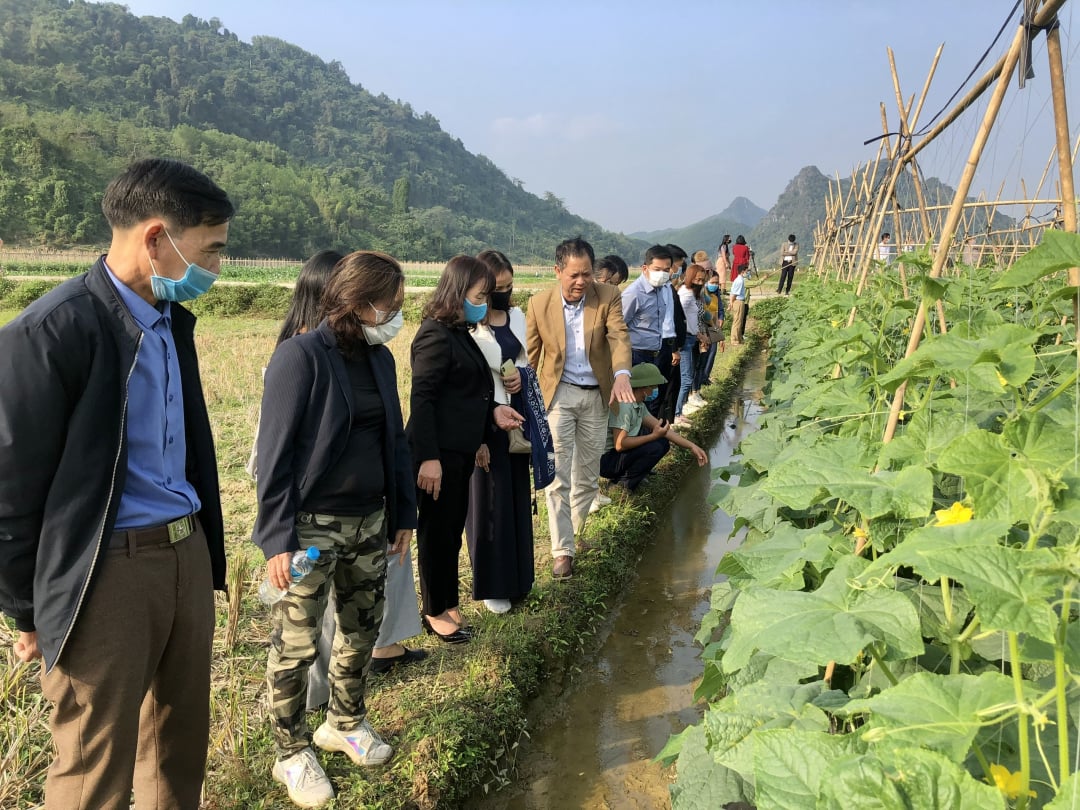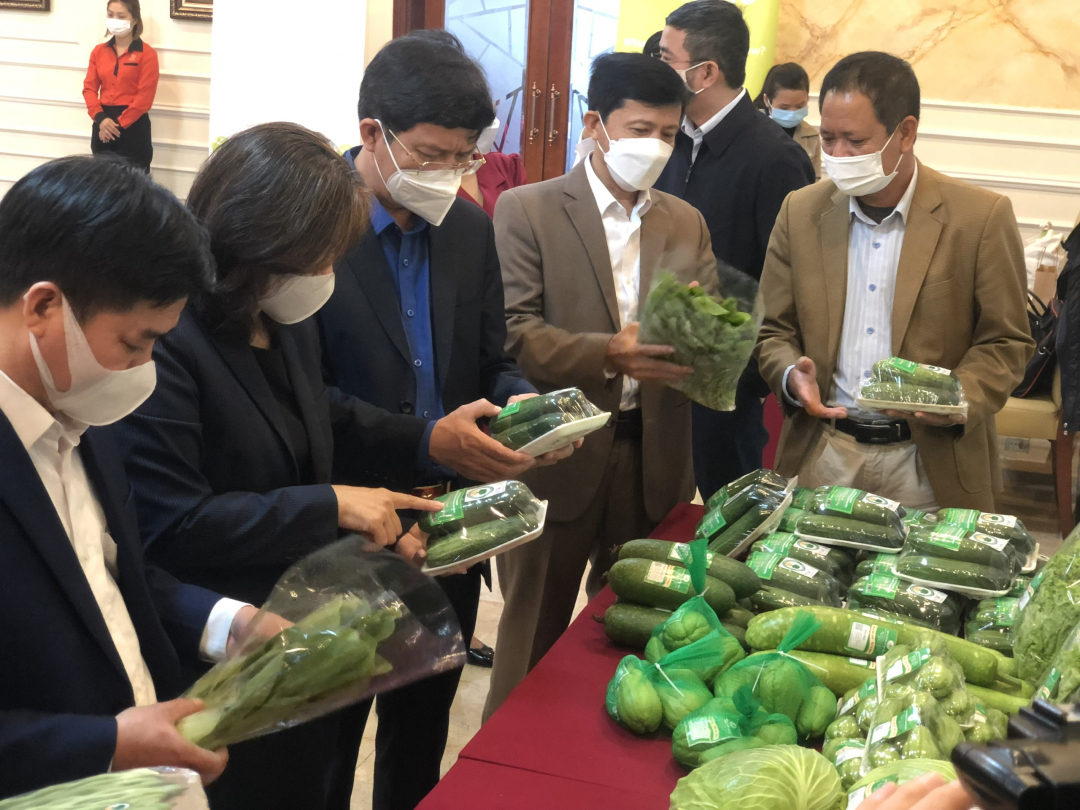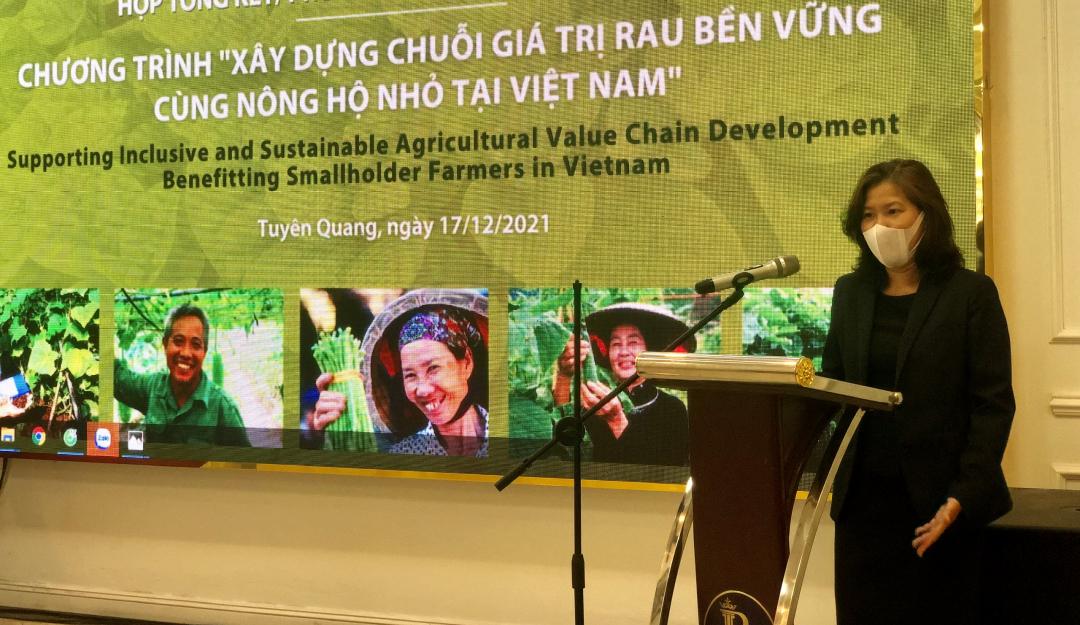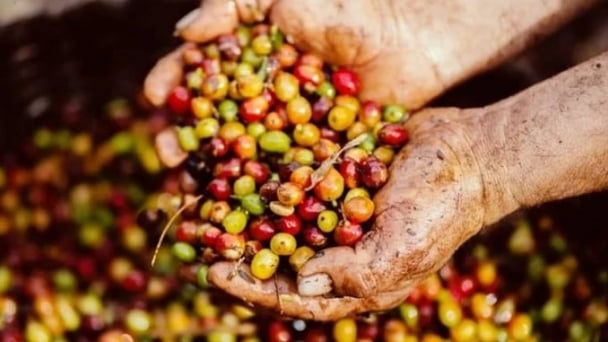June 17, 2025 | 20:42 GMT +7
June 17, 2025 | 20:42 GMT +7
Hotline: 0913.378.918
June 17, 2025 | 20:42 GMT +7
Hotline: 0913.378.918
The program "Building a sustainable vegetable value chain with smallholder farmers in Vietnam" for the 2017-2021 period is implemented by provinces and cities including Hanoi, Da Nang, Vinh Phuc, Tuyen Quang, and Ha Nam, coordinated with Rikolto In Vietnam ('Rikolto').

The volume of safe vegetables produced reached 14,000 tonnes, more than 50% compared to the expected (8,500 tonnes).
The total areas applied to the PGS (Participatory Guarantee System) model have increased by 3 times after 5 years of program implementation. It has exceeded expectations, rising to 228 hectares compared to the original plan as 70 hectares. The number of farmers directly benefiting from the program is 1,258 people.
The volume of safe vegetables produced reached 14,000 tonnes, more than 50% compared to the expected (8,500 tonnes). The vegetable quantity for collective consumption reached 6,000 tonnes, increased by 1.5 times than expected (4,000 tonnes).
The results of cooperatives' fruit and vegetable samples that participated in the inspection from 2017 until now show that all cooperatives have met the quality criteria for food safety. As a result, an estimated 200,000 consumers have benefited from the program.
Four provinces have issued PGS implementation guidelines for safe vegetables locally, including Ha Nam, Vinh Phuc, Hanoi, and Da Nang provinces. It is evidence that the recognition and application of PGS as an effective and reliable quality assurance tool by localities while creating a favorable environment for management agencies, organizations, and individuals wishing to access, learn and apply PGS in production.
The application of PGS in production areas has helped strengthen the quality control of safe vegetables, raise awareness, roles, and responsibilities of farmers in the safe production, contribute to protecting the ecological environment, and especially form group linkages among smallholder farmers to increase competitiveness in product consumption.
Some farmer groups have split up to form cooperatives or found a stable and beneficial product consumption channel, such as farmer groups in Dang Xa commune, Gia Lam district, Tien Le commune, Hoai Duc district.

The program "Building a sustainable vegetable value chain with smallholder farmers in Vietnam" for the 2017-2021 period is implemented by provinces and cities including Hanoi, Da Nang, Vinh Phuc, Tuyen Quang, and Ha Nam, coordinated with Rikolto In Vietnam.
Typical success in developing and expanding the model is An Hoa Agricultural Service Cooperative Trading in agricultural products, Tam Duong district, Vinh Phuc province. This is one of the first three cooperatives supported by Rikolto in Vinh Phuc province.
From an average output of 4-5 tonnes per day in 2018, the Cooperative has now increased to 10-20 tonnes. The members of the Cooperative's Management Board are equipped with knowledge of production organization, search for markets, have better managed the activities of the cooperative, created more jobs, and increased incomes for participating members, develop a variety of products and serve a wide range of customers such as collective kitchens, processing companies, supermarkets, etc.
Due to the increased customers, the Cooperative has expanded the raw material areas to neighboring areas and Tuyen Quang province, with nearly 300 participating households. The total areas have reached 100 hectares per year, mainly in Son Duong, Na Hang, Son Duong, Yen Son, and Chiem Hoa districts.
These are the places where ethnic minorities gather, from which the Cooperative has helped people increase their income and develop sustainable livelihoods, contributing to changing the local crop structure and creating a production-consumption chain.

The conference summarizing the program "Building a sustainable vegetable value chain with smallholder farmers in Vietnam" for the 2017-2021 period was held in Tuyen Quang province on December 17, 2021.
However, the program still has some shortcomings, such as the limited capacity of some cooperatives, leading to a lack of synchronization in the implementation of PGS in some places. In addition, the cooperative's ability of market connectivity is facing many difficulties; some areas have not been closely linked with businesses to create a sustainable value chain and have not yet attracted the participation of young people.
Mrs. Hoang My Lan, Regional Director of Rikolto, said, "In the past 5 years, we have focused on connecting producers, promoting the production of vegetables and safe products to connect with the market".
“In the coming time, we will focus on building a smart food city, which will target the producer group and the consumer group at schools and traditional markets. And we very much look forward to working with business cooperatives or enterprises to be the locomotives to link and connect the overarching chain with the manufacturing industry to have a broader impact,” said Mrs. Lan.
In addition, Rikolto will also promote working with multilateral parties to jointly come up with solutions to meet the needs of all parties in terms of production, processing, and state management to ensure that people produce safe, sustainable, and affordable. From there, all consumers have access to these products.
Translated by Ha Phuc
![Turning wind and rain into action: [5] Hue applies modern technology in disaster forecasting](https://t.ex-cdn.com/nongnghiepmoitruong.vn/608w/files/news/2025/06/17/z6704423696987_15fd32ffc26d590d204d520c9dac6786-nongnghiep-093938.jpg)
(VAN) In Hue city, modern technology has recently been applied in meteorological and hydrological forecasting and warning, helping to reduce the damage caused by natural disasters.

(VAN) A cutting-edge farming technique being implemented on an experimental ranch in Arizona's Sonoran Desert has already saved a billion gallons of water over five years, according to Civil Eats.

(VAN) Poultry and pig production and the environment can be boosted through enhanced water technology, according to new research.

(VAN) Coffee prices on June 16, 2025 are unchanged. In Vietnam, local trading prices are holding steady, ranging around VND 112,000 – VND 112,500/kg.
![Turning wind and rain into action: [4] Bringing climate bulletins to remote and isolated areas](https://t.ex-cdn.com/nongnghiepmoitruong.vn/608w/files/linhnhp/2025/06/14/1152-z6704423696987_15fd32ffc26d590d204d520c9dac6786-nongnghiep-151141.jpg)
(VAN) The Vietnam Agriculture and Nature Newspaper interviewed Mr. Vu Thai Truong, Acting Head of Climate Change and Environment at UNDP Vietnam, to gain deeper insight into how climate bulletins are delivered to farmers.

(VAN) In Tien Giang, a high-tech shrimp farm has developed a distinctive energy-saving farming model that has yielded promising results.
![Turning wind and rain into action: [3] 300.000 farmers benefit from agro-climatic bulletins](https://t.ex-cdn.com/nongnghiepmoitruong.vn/608w/files/news/2025/06/12/e5a48259d6a262fc3bb3-nongnghiep-125122.jpg)
(VAN) The agro-climatic bulletin has become a valuable tool for farmers in the Mekong Delta. After more than five years of implementation, the initiative is gradually being expanded nationwide.